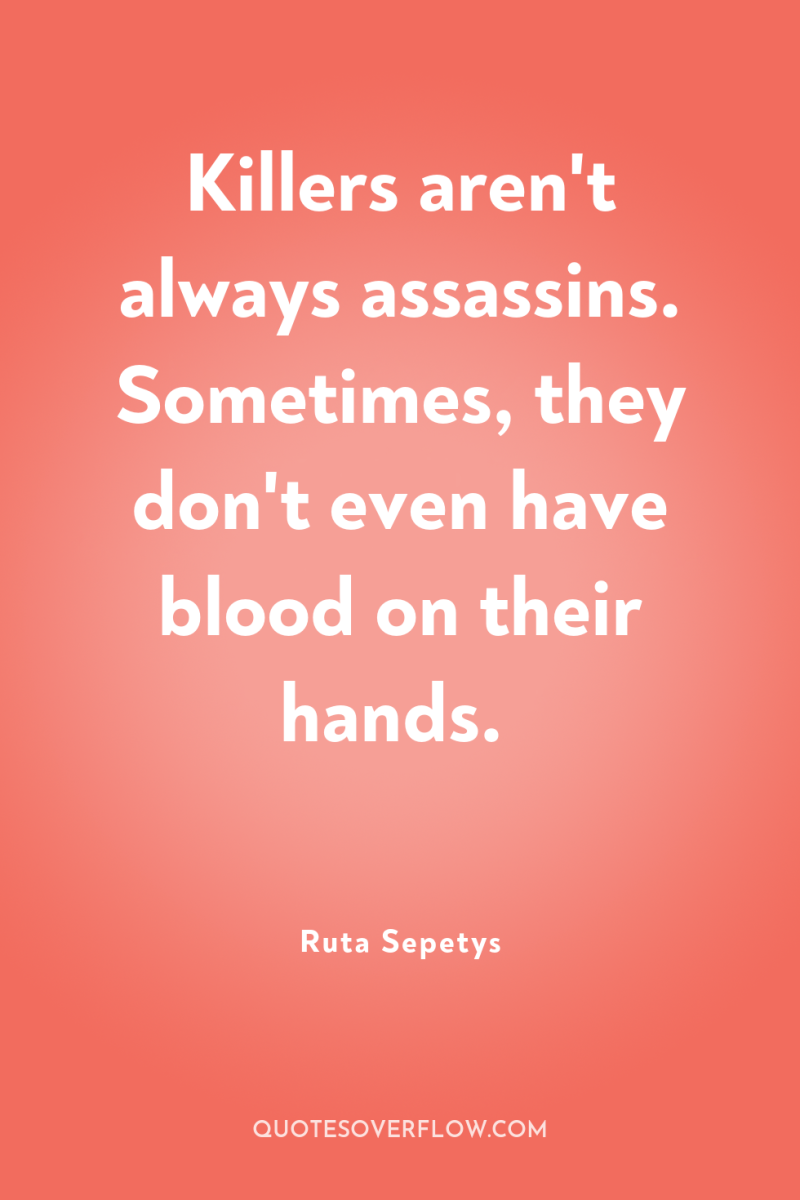
1
Killers aren't always assassins. Sometimes, they don't even have blood on their hands.Ruta Sepetys
2
Anything that’s human is mentionable, and anything that is mentionable can be more manageable. When we can talk about our feelings, they become less overwhelming, less upsetting, and less scary. The people we trust with that important talk can help us know that we are not alone.Fred Rogers
3
We cannot have a world where everyone is a victim. "I'm this way because my father made me this way. I'm this way because my husband made me this way." Yes, we are indeed formed by traumas that happen to us. But then you must take charge, you must take over, you are responsible.Camille Paglia
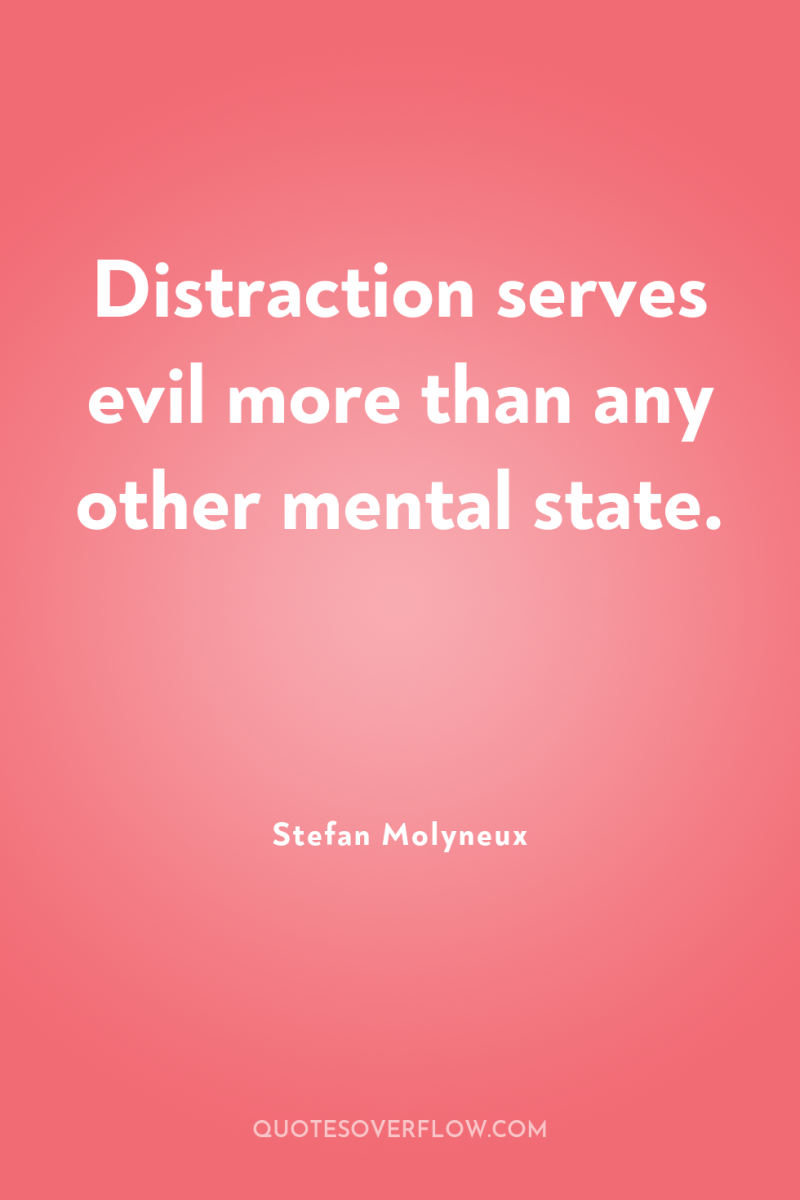
4
Distraction serves evil more than any other mental state.Stefan Molyneux
5
If you spend time with crazy and dangerous people, remember — their personalities are socially transmitted diseases; like water poured into a container, most of us eventually turn into — or remain — whoever we surround ourselves with. We can choose our tribe, but we cannot change that our tribe is our destiny.Stefan Molyneux

6
Deep connection is the antidote to madness.Stefan Molyneux

7
I refuse to let the standards of evil people chip away at my capacity for integrity.Stefan Molyneux
8
Asshole Proximity DisorderStefan Molyneux
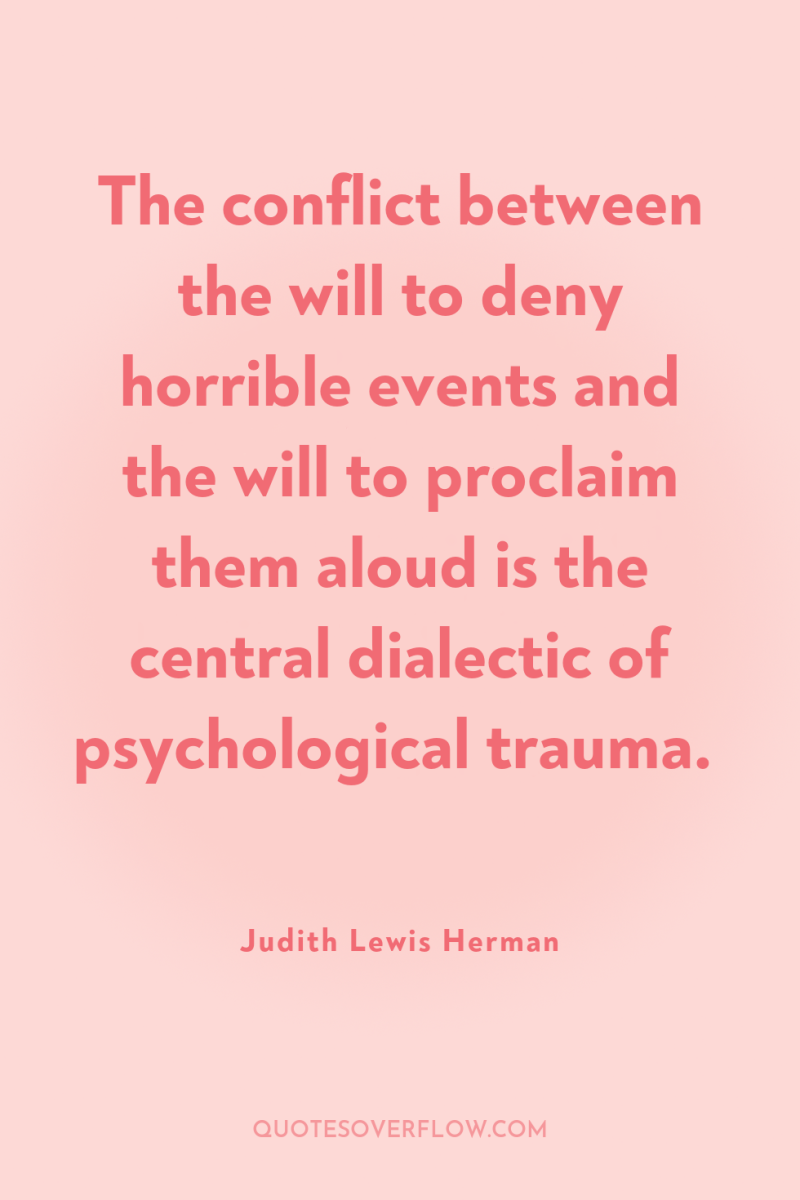
9
The conflict between the will to deny horrible events and the will to proclaim them aloud is the central dialectic of psychological trauma.Judith Lewis Herman
10
The ORDINARY RESPONSE TO ATROCITIES is to banish them from consciousness. Certain violations of the social compact are too terrible to utter aloud: this is the meaning of the word unspeakable. Atrocities, however, refuse to be buried. Equally as powerful as the desire to deny atrocities is the conviction that denial does not work. Folk wisdom is filled with ghosts who refuse to rest in their graves until their stories are told. Murder will out. Remembering and telling the truth about terrible events are prerequisites both for the restoration of the social order and for the healing of individual victims. The conflict between the will to deny horrible events and the will to proclaim them aloud is the central dialectic of psychological trauma. People who have survived atrocities often tell their stories in a highly emotional, contradictory, and fragmented manner that undermines their credibility and thereby serves the twin imperatives of truth-telling and secrecy. When the truth is finally recognized, survivors can begin their recovery. But far too often secrecy prevails, and the story of the traumatic event surfaces not as a verbal narrative but as a symptom. The psychological distress symptoms of traumatized people simultaneously call attention to the existence of an unspeakable secret and deflect attention from it. This is most apparent in the way traumatized people alternate between feeling numb and reliving the event. The dialectic of trauma gives rise to complicated, sometimes uncanny alterations of consciousness, which George Orwell, one of the committed truth-tellers of our century, called "doublethink, " and which mental health professionals, searching for calm, precise language, call "dissociation." It results in protean, dramatic, and often bizarre symptoms of hysteria which Freud recognized a century ago as disguised communications about sexual abuse in childhood..Judith Lewis Herman
11
Truth for anyone is a very complex thing. For a writer, what you leave out says as much as those things you include. What lies beyond the margin of the text? The photographer frames the shot; writers frame their world. Mrs Winterson objected to what I had put in, but it seemed to me that what I had left out was the story’s silent twin. There are so many things that we can’t say, because they are too painful. We hope that the things we can say will soothe the rest, or appease it in some way. Stories are compensatory. The world is unfair, unjust, unknowable, out of control. When we tell a story we exercise control, but in such a way as to leave a gap, an opening. It is a version, but never the final one. And perhaps we hope that the silences will be heard by someone else, and the story can continue, can be retold. When we write we offer the silence as much as the story. Words are the part of silence that can be spoken. Mrs Winterson would have preferred it if I had been silent. Do you remember the story of Philomel who is raped and then has her tongue ripped out by the rapist so that she can never tell? I believe in fiction and the power of stories because that way we speak in tongues. We are not silenced. All of us, when in deep trauma, find we hesitate, we stammer; there are long pauses in our speech. The thing is stuck. We get our language back through the language of others. We can turn to the poem. We can open the book. Somebody has been there for us and deep-dived the words. I needed words because unhappy families are conspiracies of silence. The one who breaks the silence is never forgiven. He or she has to learn to forgive him or herself. .Jeanette Winterson
12
Whether it’s an Iraqi widow mourning her dead loved ones standing helplessly in the rubble of her former home or a dying soldier in an Iraqi city street asking, “Why, God? Why is this happening? Where are you?” I can’t help but wonder the same. You realize that there is no justice, no karmic retribution swift enough, and that happy endings are a terrible, terrible lie. We are all subject to the same blind boot stomp and our luck is merely where we happen to be standing when death inevitably comes roaring down upon us.M.B. Dallocchio
13
The idea that traumatic residues–or unresolved stories–can be inherited is groundbreaking.Sharon Salzberg
14
No, Sky. You didn't tell her everything…you told you everything. Those things happened to you, not to someone else. They happened to Hope. They happened to Sky. They happened to the best friend that I loved all those years ago, and they happened to the best friend I love who’s looking back at me right now.Colleen Hoover
15
The traumatized person is often relieved simply to learn the true name of her condition. By ascertaining her diagnosis, she begins the process of mastery. No longer imprisoned in the wordlessness of the trauma, she discovers that there is a language for her experience. She discovers that she is not alone; others have suffered in similar ways. She discovers further that she is not crazy; the traumatic syndromes are normal human responses to extreme circumstances. And she discovers, finally, that she is not doomed to suffer this condition indefinitely; she can expect to recover, as others have recovered..Judith Lewis Herman
16
Some things cannot be fixed; they can only be carried. Grief like yours, love like yours, can only be carried. Survival in grief, even eventually building a new life alongside grief, comes with the willingness to bear witness, both to yourself and to the others who find themselves inside this life they didn’t see coming. Together, we create real hope for ourselves, and for one another. We need each other to survive. I wish this for you: to find the people you belong with, the ones who will see your pain, companion you, hold you close, even as the heavy lifting of grief is yours alone. As hard as they may seem to find at times, your community is out there. Lookfor them. Collect them. Knit them into a vast flotilla of light that can hold you. .Megan Devine
17
The nutritionist said I should eat root vegetables. Said if I could get down thirteen turnips a day I would be grounded, rooted. Said my head would not keep flying awayto where the darkness lives. The psychic told me my heart carries too much weight. Said for twenty dollars she’d tell me what to do. I handed her the twenty. She said, “Stop worrying, darling. You will find a good man soon.” The first psycho therapist told me to spendthree hours each day sitting in a dark closetwith my eyes closed and ears plugged. I tried it once but couldn’t stop thinkingabout how gay it was to be sitting in the closet. The yogi told me to stretch everything but the truth. Said to focus on the out breath. Said everyone finds happinesswhen they care more about what they givethan what they get. The pharmacist said, “Lexapro, Lamicatl, Lithium, Xanax.”The doctor said an anti-psychotic might help meforget what the trauma said. The trauma said, “Don’t write these poems. Nobody wants to hear you cryabout the grief inside your bones.” But my bones said, “Tyler Clementi jumpedfrom the George Washington Bridgeinto the Hudson River convincedhe was entirely alone.” My bones said, “Write the poems.Andrea Gibson
18
Parents who discipline their child by discussing the consequences of their actions produce children who have better moral development , compared to children whose parents use authoritarian methods and punishment.Simon BaronCohen
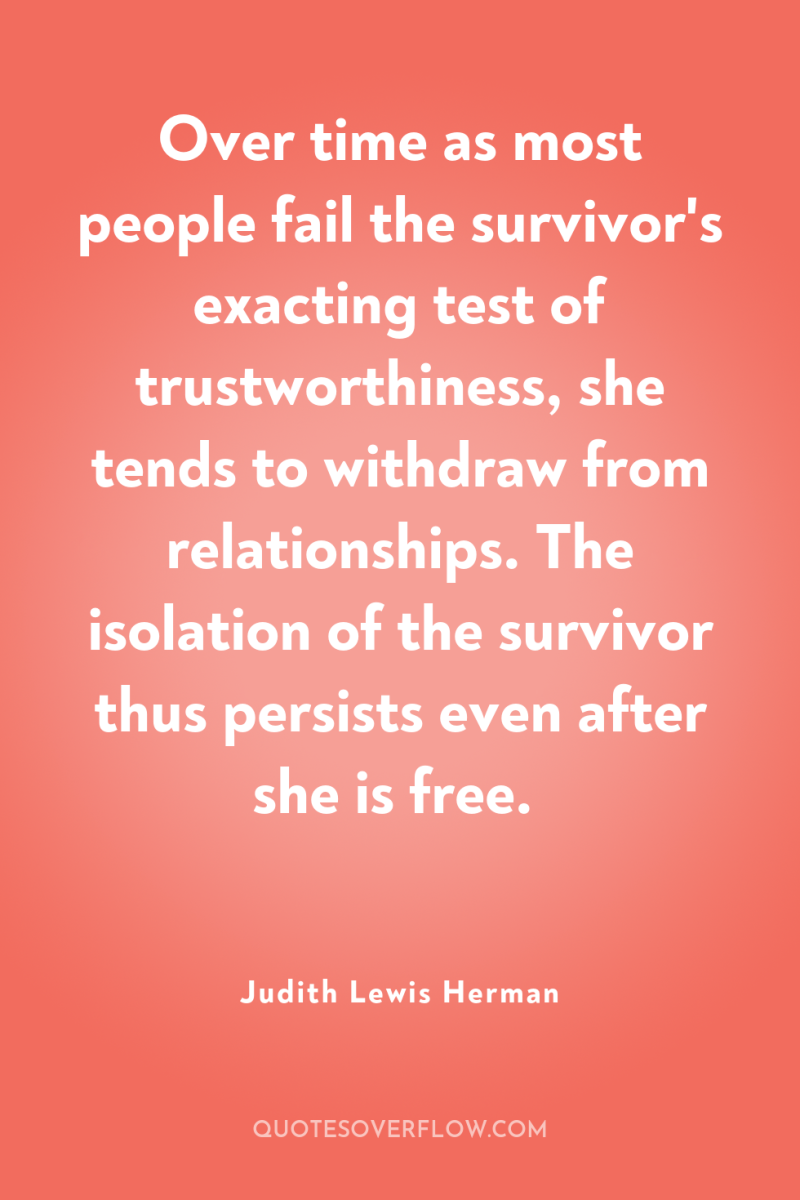
19
Over time as most people fail the survivor's exacting test of trustworthiness, she tends to withdraw from relationships. The isolation of the survivor thus persists even after she is free.Judith Lewis Herman
20
We are threatened with suffering from three directions: from our body, which is doomed to decay..., from the external world which may rage against us with overwhelming and merciless force of destruction, and finally from our relations with other men... This last source is perhaps more painful to use than any other. (p77)Sigmund Freud
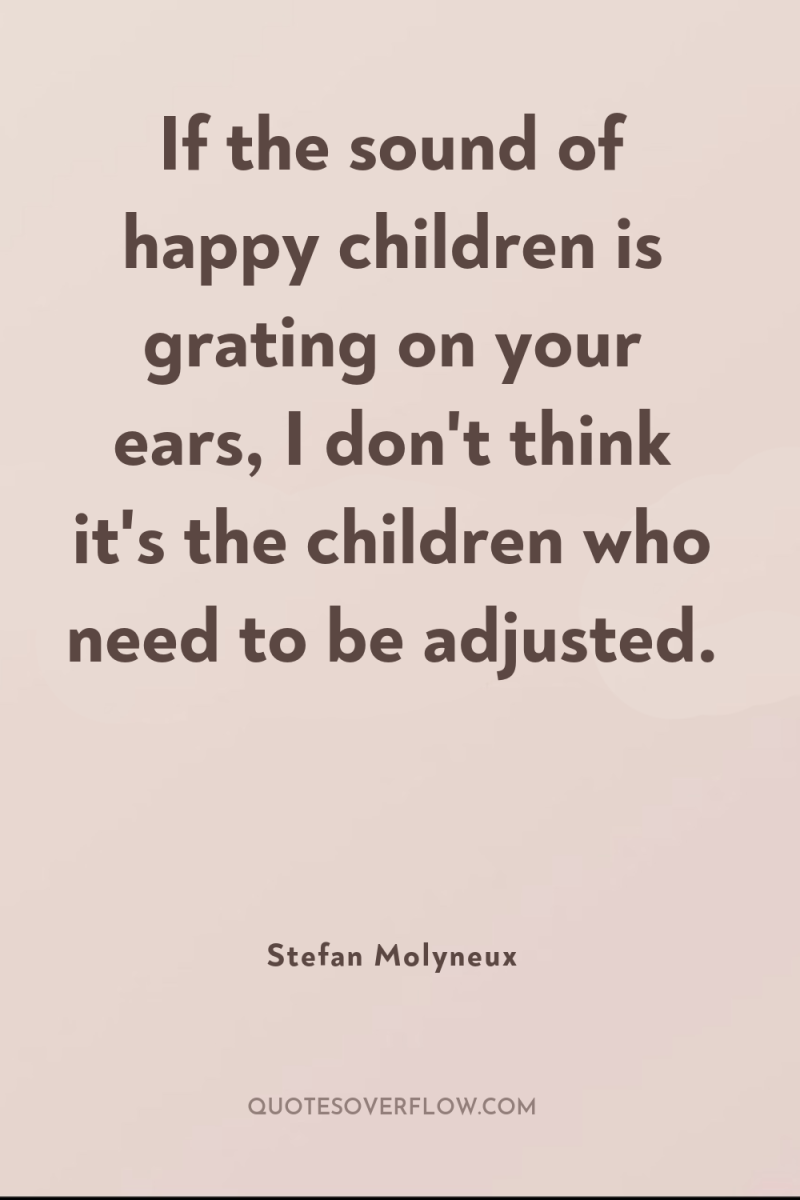
21
If the sound of happy children is grating on your ears, I don't think it's the children who need to be adjusted.Stefan Molyneux
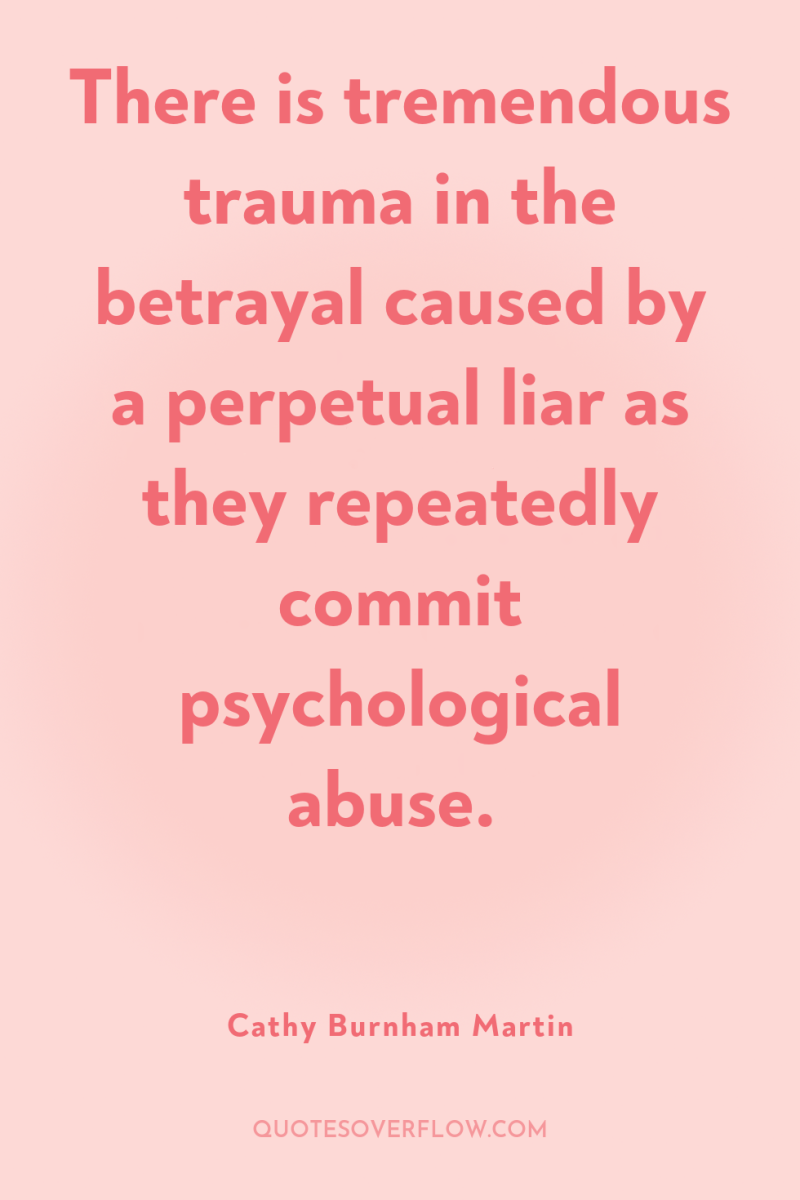
22
There is tremendous trauma in the betrayal caused by a perpetual liar as they repeatedly commit psychological abuse.Cathy Burnham Martin
23
Confusing being mortal with being threatened can occur in any realm. The fact that something could go wrong does not mean that we are in danger. It means we are alive. Mortality is the sign of life. In the most intimate and personal of arenas, many of us have love and trusted someone who violated that trust. So when someone else comes along who intrigues us, whose interests we share, who we enjoy being with, with whom there could b some mutual enrichment and understanding, that does not mean that we are being violated again. Experiencing anxiety does not mean that anyone is doing anything to us that is unjust. .Sarah Schulman
24
Some memories never heal. Rather than fading with the passage of time, those memories become the only things that are left behind when all else is abraded. The world darkens, like electric bulbs going out one by one. I am aware that I am not a safe person.Han Kang
25
PTSD is a whole-body tragedy, an integral human event of enormous proportions with massive repercussions.Susan Pease Banitt
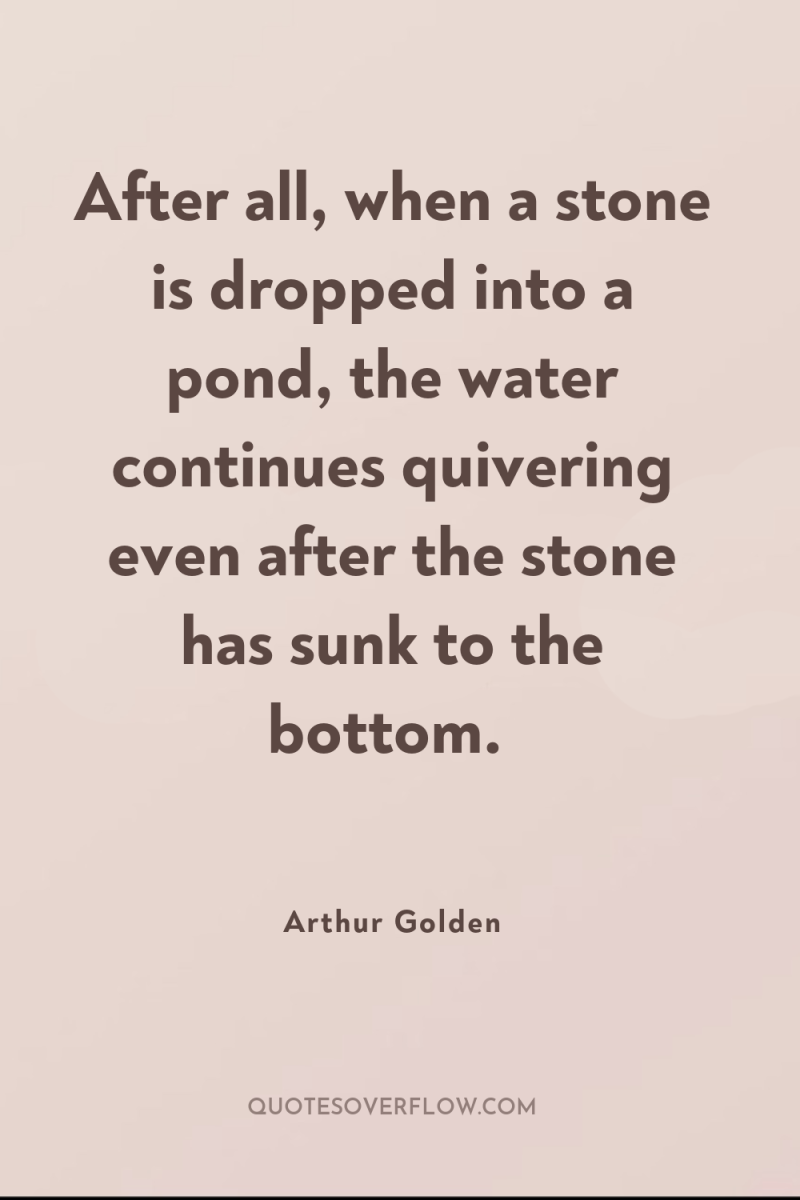
26
After all, when a stone is dropped into a pond, the water continues quivering even after the stone has sunk to the bottom.Arthur Golden
27
BEFRIENDING THE BODY Trauma victims cannot recover until they become familiar with and befriend the sensations in their bodies. Being frightened means that you live in a body that is always on guard. Angry people live in angry bodies. The bodies of child-abuse victims are tense and defensive until they find a way to relax and feel safe. In order to change, people need to become aware of their sensations and the way that their bodies interact with the world around them. Physical self-awareness is the first step in releasing the tyranny of the past. In my practice I begin the process by helping my patients to first notice and then describe the feelings in their bodies–not emotions such as anger or anxiety or fear but the physical sensations beneath the emotions: pressure, heat, muscular tension, tingling, caving in, feeling hollow, and so on. I also work on identifying the sensations associated with relaxation or pleasure. I help them become aware of their breath, their gestures and movements. All too often, however, drugs such as Abilify, Zyprexa, and Seroquel, are prescribed instead of teaching people the skills to deal with such distressing physical reactions. Of course, medications only blunt sensations and do nothing to resolve them or transform them from toxic agents into allies. The mind needs to be reeducated to feel physical sensations, and the body needs to be helped to tolerate and enjoy the comforts of touch. Individuals who lack emotional awareness are able, with practice, to connect their physical sensations to psychological events. Then they can slowly reconnect with themselves.Unknown
28
This book is a memoir - not of specific life events, but of the processes of dissociation, and of re-enlivening emotions that are shameful to admit or even to feel. It is an account of the altered states that trauma induces, which make it possible to survive a life-threatening event but impair the capacity to feel fear, and worse still, impair the ability to love. (292)Jessica Stern

29
And then things would be fine. Then I'd be fine.Sarah J. Maas
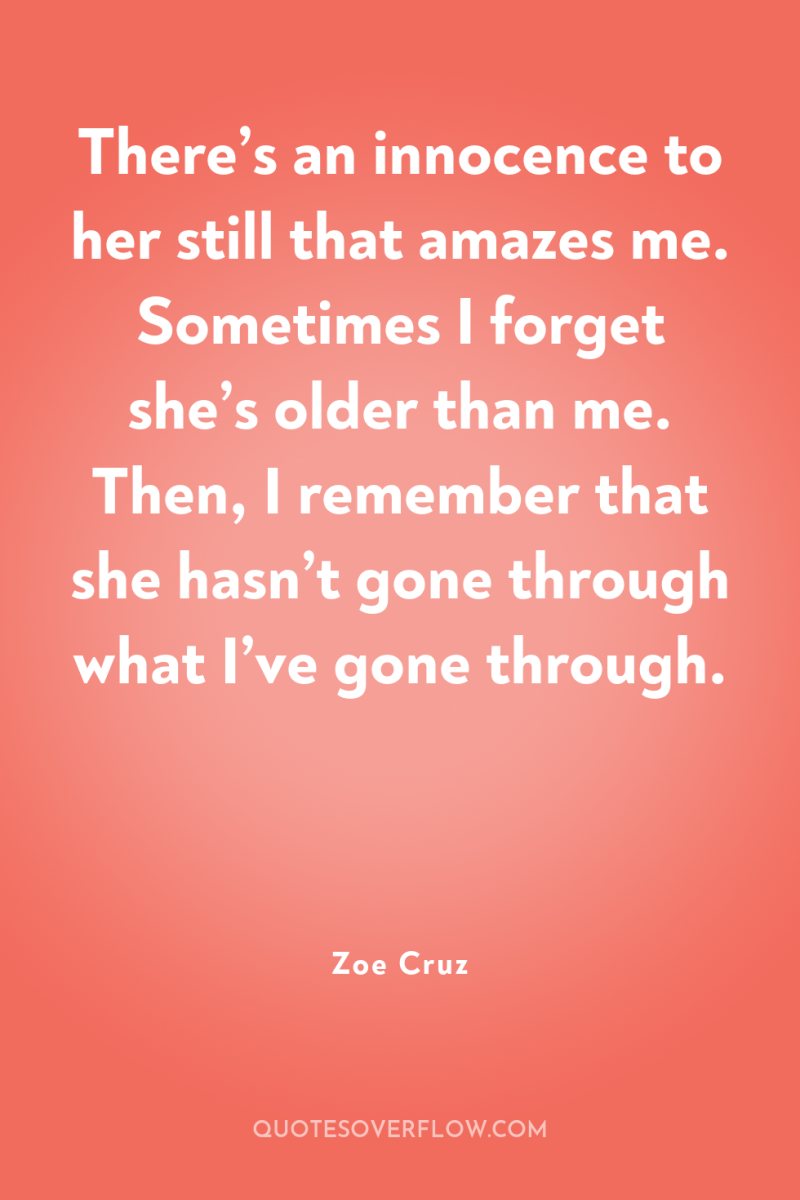
30
There’s an innocence to her still that amazes me. Sometimes I forget she’s older than me. Then, I remember that she hasn’t gone through what I’ve gone through.Zoe Cruz

31
There are people that damage you for life. The day they walked into your life will forever be a turning point you will use to label and count your years with... Your own BC and AD.Malak El Halabi
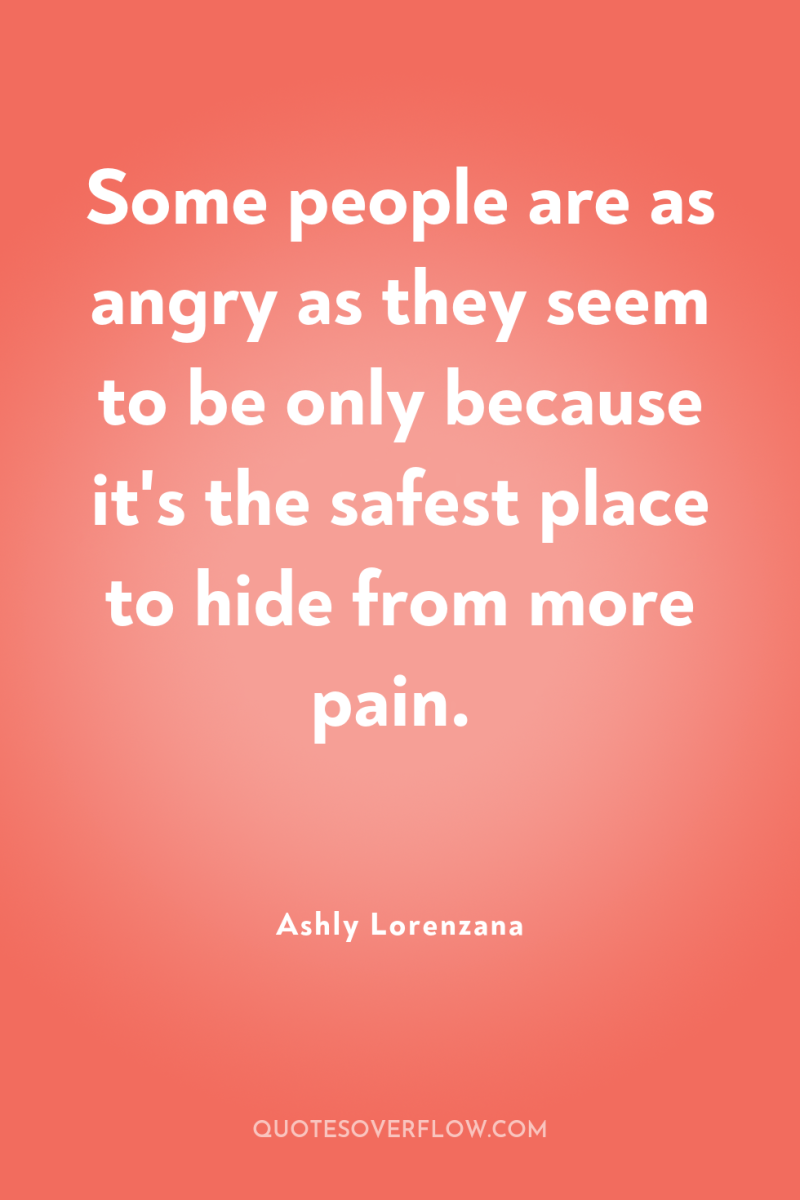
32
Some people are as angry as they seem to be only because it's the safest place to hide from more pain.Ashly Lorenzana
33
We are Craiglockhart's success stories. Look at us. We don't remember, we don't feel, we don't think - at least beyond the confines of what's needed to do the job. By any proper civilized standard (but what does that mean now?) we are objects of horror. But our nerves are completely steady. And we are still alive.Pat Barker

34
A wave of saudade swept over me as I realized home never existed at all. The concept of home felt far from my reach, and I felt sick with longing.M.B. Dallocchio

35
Adversity has the remarkable ability of introducing the real you to yourself.M.B. Dallocchio
36
The most insidious of our country, the greediest and highest rung of our socioeconomic ladder, line their pockets with misappropriated funds as military personnel and hordes of civilians are maimed or killed. It’s not their children out there, blinded by manufactured patriotism or lured into the service with the promise of economic stability, all with the sanctimonious blessings of misguided public consent by way of corporate, state-sponsored media. It won’t be their children who are terrorized by Wahabbist insurgents tearing through city blocks and rural areas as only an ever-devouring plague could. It won’t be any of their loved ones watching thousands of years of civilization unraveling like an old sweater as each thread of wool is lit on fire or stolen to sell on the black market for greedy consumers with a fetish for hijacked Mesopotamian artifacts. .M.B. Dallocchio
37
There are people who come home from war and want to talk about the pain, but no one wants to listen; there are others who want to keep silent and repress the memories, and all their family and friends want is to talk about it. I call this the war veteran reintegration paradox.M.B. Dallocchio

38
I left a piece of my soul that will always rightfully belong in the desert.M.B. Dallocchio
39
In movies, war only looks romantic. “Tell my gal I love her…” close-up shot, and fade out. It doesn’t work as beautifully and neat in real life. Flying chunks of human flesh and screaming orphans really put that Hollywood take into perspective and there is nothing clean or sterile about any of it. When people die, it’s fucking horrible.M.B. Dallocchio
40
Everyone around me was allowed, permitted to fall apart; yet I had to think twice. I couldn't bear to take another dip into an ocean of solitude for another taste of ostracization. I felt I would die.M.B. Dallocchio
41
Veterans being sent into unjust wars for corporate profit is a perversion of trust, at best. I found the emotional manipulation of both sides, the propaganda at play so incredibly revolting that I couldn't stand to idly wave a flag or flaunt yellow ribbons without asking serious questions regarding motive.M.B. Dallocchio
42
A woman in combat? Yes. Since when? Since Native American warrior Buffalo Calf Road Woman knocked that prick General George Custer off of his horse. Since Pantea Arteshbod propelled herself to become one of the greatest Persian commanders during the reign of Cyrus the Great. Since Hua Mulan disguised herself as a male to engage in combat and became one of China’s most respected heroines.M.B. Dallocchio
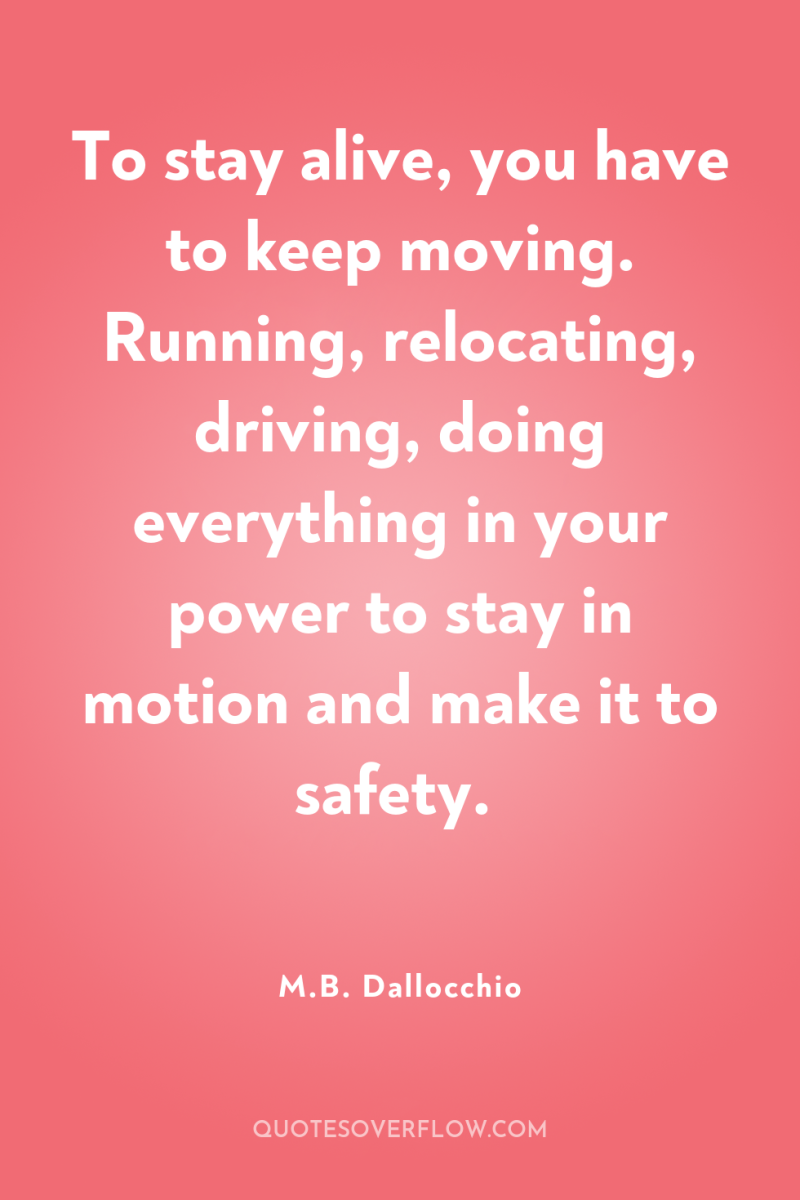
43
To stay alive, you have to keep moving. Running, relocating, driving, doing everything in your power to stay in motion and make it to safety.M.B. Dallocchio
44
A moving target is harder to kill, and I didn't stop running, maneuvering, until I reached home base, where I could breathe between death-defying sprints. I just need to make it home alive, and this will all be over, I told myself. Home.M.B. Dallocchio

45
The war never leaves.Victoria Aveyard
46
Telling my story was supposed to be a good thing but it had just made everything worse.Unknown
47
I was so tired of his being even-keeled in the face of all that was upsetting and ugly and illogical.Unknown
48
It's the whistling, " Laila said to Tariq, "the damn whistling, I hate more than anything" Tariq nodded knowingly. It wasn't so much the whistling itself, Laila thought later, but the seconds between the start of it and impact. The brief and interminable time of feeling suspended. The not knowing. The waiting. Like a defendant about to hear the verdict. Often it happened at dinner, when she and Babi were at the table. When it started, their heads snapped up. They listened to the whistling, forks in mid-air, unchewed food in their mouths. Laila saw the reflection of their half-lit faces in the pitch-black window, their shadows unmoving on the wall. The whistling. Then the blast, blissfully elsewhere, followed by an expulsion of breath and the knowledge that they had been spared for now while somewhere else, amid cries and choking clouds of smoke, there was a scrambling, a barehanded frenzy of digging, of pulling from the debris, what remained of a sister, a brother, a grandchild. But the flip side of being spared was the agony of wondering who hadn't. After every rocket blast, Laila raced to the street, stammering a prayer, certain that, this time, surely this time, it was Tariq they would find buried beneath the rubble and smoke. At night, Laila lay in bed and watched the sudden white flashes reflected in her window. She listened to the rattling of automatic gunfire and counted the rockets whining overhead as the house shook and flakes of plaster rained down on her from the ceiling. Some nights, when the light of rocket fire was so bright a person could read a book by it, sleep never came. And, if it did, Laila's dreams were suffused with fire and detached limbs and the moaning of the wounded. Morning brought no relief. The muezzin's call for namaz rang out, and the Mujahideen set down their guns, faced west, and prayed. Then the rugs were folded, the guns loaded, and the mountains fired on Kabul, and Kabul fired back at the mountains, as Laila and the rest of the city watched as helpless as old Santiago watching the sharks take bites out of his prize fish.Khaled Hosseini

49
This last best luck of all: that earth should gape for me when my great deeds were ended.E.R. Eddison
50
Where were all heroical parts but in Helteranius? and a man might make a garment for the moon sooner than fit the o'erleaping actions of great Jalcanaius, who now leaveth but his body to bedung that earth that was lately shaken at his terror. I have waded in red blood to the knee; and in this hour, in my old years, the world is become for me a vision only and a mock-show.E.R. Eddison
51
Trauma is personal. It does not disappear if it is not validated. When it is ignored or invalidated the silent screams continue internally heard only by the one held captive. When someone enters the pain and hears the screams healing can begin.Danielle Bernock
52
When you’re a kid, you don’t think about big stuff that could change your life. You think about small things that might terrify you —like a bad report card or missing a goal in front of all your friends or your friends no longer wanting to play with you. Because that's the biggest stuff you know. The biggest disappointments are all tied to this small little universe of yours, because bigger things cannot fit into a small universe. If you wanted bigger things in there you needed to have more room —or make more room. Perhaps you thought about your parents or your pets dying, which was rare. But all you knew was you would be terribly sad and lonely. And on those occasions when people or pets actually died, someone usually came along and distracted you from feeling too much of your actual feelings. Grownups did that —they never left you alone to feel alone or think alone too much. They tended to think you are too small to know how to think and feel in big heaps, so they took parts of your heap onto themselves. To help — but in the long run —it doesn’t help at all. Because if you do not see, or feel or think, or taste the bitter things in life, you don’t know they exist. You have not seen enough of the world to know how terrible it could be. And unfortunately for Sam, this inability to process change persisted into adulthood.Adelheid Manefeldt
53
Soul work is the 'more' that we need to do to heal our souls. Soul retrieval is one more step toward balance and wholeness. The trauma of major illness, death, financial devastation, abuse, terror, and other stressors in our lives will not cease while we live and breathe. But, knowing they can rob us of our soul allows us to address those loses before or as they occur, so that we do not have to struggle to survive without that which makes us who we are. .Barbara Lieberman
54
We stand on the edge of national metamorphosis armed with hope and lengthy dreams, and the desire to leave the mistakes of the past far, far behind us. Some wake to a blessed plague of amnesia hoping never to recover the damage that was done. Some keep marching forward feeling the heavy ache of everything they wish to change about themselves and our nation dragging behind them like a long, prolonged shadow. And still others shine above the sun, sparkling like raging cosmonauts, propelled by the strength and power of their pathological optimism. I tend to slingshot between all 3 of these distinct planets with unruly fortitude. This is where art comes in. It helps me deal with my compulsive randomness, and allows me to abate life's repressions while exploring all possibilities of transformation and growth. And for this, I am eternally grateful.Otep Shamaya
55
If you cannot read Shakespeare, or Melville, or Toni Morrison because it will trigger something traumatic in you, and you'll be harmed by the read of the text because you are still defining yourself through your self-victimization, then you need to see a doctor.Bret Easton Ellis
56
And though, indeed, it only happened once, it’s gone on happening, the way unique and momentous things do, for ever and ever, as long as there’s a memory for them to happen in …Graham Swift
57
We will remember the hurt, the injustice, and the trauma, but we can forgive the sinner.Cathy Burnham Martin
58
I dreamt i crawled on top of you and kissed your hips, one at a time, my lips a smolder. i straddled your waist and pressed both shaking hands against your torso. spongy, like an old tree on the forest floor. i push and your flesh sinks inwardly, collapsing with decay, a soft shushing sound. a yawning hole where your organs should be. maggots used to live here until your own poison killed them off. i laid my cheek into the loam and three little mushrooms brushed over my eyelid. peat, decomposing matter, all of it, whatever you wish to call it, rested in the cavity of your chest. and there i planted seeds in the hopes something good would come out of you.Taylor Rhodes
59
I stood there a long while, staring at that tree. It looked so strong So beautiful. Hurt right down the middle But alive and well. Cee touched my shoulder Lightly. Frank? Yes? Come on, brother. Let's go home.Toni Morrison
60
There are wounds that never show on the body that are deeper and more hurtful than anything that bleeds.Laurell K. Hamilton
61
There always seemed to be a better way, except when it came to people. Once broken, people couldn't be repaired.Michael J. Sullivan
62
I shared with Fleur the mysterious self-contempt of the survivor. There were times we hated who we were, and who we had to become, in order not to follow those we loved into the next world. We grew hard. We became impenetrable, sparing of our pity. Sorrows that leveled other people were small to us. We made no move to avoid pain. Sometimes we even welcomed it--we were clumsy with knives, fire, boiling water, steel traps. Pain took our minds off the greater pain that was the mistake that we still existed.Louise Erdrich
63
The pain of an unpublished manuscript is akin to the trauma of bearing an unborn.Anurag Shourie
64
Admitting pain humbles us to the reality of our personal histories and our present conditions. We no longer have to pretend we are something that we are not.Steven Franssen
65
SE Self Execution the act will always be greater than the pain.Stanley Victor Paskavich
66
When it comes to mental illness most of the diagnoses are similar or the same yet they can never display how we individually go through our pain.Stanley Victor Paskavich
67
When you have mental illness it's common to be shunned by your family or friends it wouldn't happen if they knew the pain you were in.Stanley Victor Paskavich
68
Sitting on my bed with all these things I used to love but not loving them anymore, I just wanted to set them on fire. That's when I knew I was never going to be all right again.Wendy Walker
69
I wanted to peel myself off of me.Wendy Walker
70
Mental pain is less dramatic than physical pain, but it is more common and also more hard to bear. The frequent attempt to conceal mental pain increases the burden: it is easier to say 'My tooth is aching' than to say 'My heart is broken'. Yet if the cause is accepted and faced, the conflict will strengthen and purify the character and in time the pain will usually pass. Sometimes, however, it persists and the effect is devastating; if the cause is not faced or not recognised, it produces the dreary state of the chronic neurotic. But some by heroism overcome even chronic mental pain. They often produce brilliant work and strengthen, harden, and sharpen their characters till they become like tempered steel.C.s. Lewis
71
What they don’t tell you about the illusionis that I am as much lion as I am lion tamer. And I got good at inflicting pain the same way I got goodat soothing it. This, we call unfortunate, but inevitable.Ashe Vernon
72
Bitter truths have the power to expect backups if they are shared at all.Hira Mariam
73
It had started to drizzle. The lamp poles cast a kaleidoscope of light dancing across the puddles in the road. The rain made Sam feel even more lost now, as if these shadowy events were invisible to the world. As if the night was cloaked in anonymity. This wasn’t a peaceful rain - it was a sad one. A drizzle, which wept for the inevitable. Sam knew even if she got Alison out of this alive, the cuts on their lives had already been made, pooling the blood of consequence beneath their feet as the night dragged on. Whichever way this went, they’d have scars from this night. Scars and scabs and things which could not be spoken. And that made her feel utterly hopeless. .Adelheid Manefeldt
74
Bitter truths have the need to expect backups if they are shared at all.Hira Mariam
75
To be hurt is, sometimes, a lucky thing–a fortunate interruption along a road that otherwise may have ended in blindly hurting others. When we heal from being hurt by a person, we realize the importance of not hurting people. Perhaps it is not the most fun way to learn this lesson, but it is a method of life's teachings nonetheless.Vironika Tugaleva
76
How can he call it all fun? Does all this. all this trauma and torture that he made me go through means nothing? What if he had to go through the same, what then? What if his legs would be itching right now from all the pain that they spent being dragged?Ritika Chhabra
77
Pain is inevitable... Suffering is optional. We will all have to endure trauma and challenges. What matters is how we move forward afterward. Do we keep carrying the trauma and its causes in our mind? Or can we find a way to let go of them, to end our own suffering?... This is where mindfulness can help us.David Michie
78
As a deep wound comes to the surface, things can appear worse for a time.Renae A.Sauter
79
No one ever told me how sorrow traumatizes your heart, making you think it will never beat exactly the same way again. No one ever told me how grief feels like a wet sock in my mouth. One I’m forced to breathe through, thinking that with each breath I’ll come up short and suffocate.Sarah Noffke
80
Maybe it was our shared trauma, or maybe it was a combination of things, but I felt warmth emenate from my heart and spread throughout my chest.Theresa Braun
81
The age of lost innocence varies for each person. Some lose it when they learn that their childhood fantasies are merely myth, while others lose theirs due to trauma. As adults, we often look down our noses at those who manage to retain their innocence; we scoff at these few as being immature or irresponsible. Could it be that we hide our envy behind the cloudy eyes of our lost innocence?J.D. Stroube
82
God has mercifully ordered that the human brain works slowly; first the blow, hours afterwards the bruise.Unknown
83
Since her time in the necromancer’s clutches, she was still recovering lost memories from the quicksand of her mind. They’d drop like nuclear bombs, freezing her at the worst time as visuals which should’ve stayed forever buried bubbled to the surface.Katherine McIntyre
84
The inability to get something out of your head is a signal that shouts, “Don’t forget to deal with this! ” As long as you experience fear or pain with a memory or flashback, there is a lie attached that needs to be confronted. In each healing step, there is a truth to be gathered and a lie to discard.Christina Enevoldsen
85
In response to threat and injury, animals, including humans, execute biologically based, non-conscious action patterns that prepare them to meet the threat and defend themselves. The very structure of trauma, including activation, dissociation and freezing are based on the evolution of survival behaviors. When threatened or injured, all animals draw from a "library" of possible responses. We orient, dodge, duck, stiffen, brace, retract, fight, flee, freeze, collapse, etc. All of these coordinated responses are somatically based- they are things that the body does to protect and defend itself. It is when these orienting and defending responses are overwhelmed that we see trauma. The bodies of traumatized people portray "snapshots" of their unsuccessful attempts to defend themselves in the face of threat and injury. Trauma is a highly activated incomplete biological response to threat, frozen in time. For example, when we prepare to fight or to flee, muscles throughout our entire body are tensed in specific patterns of high energy readiness. When we are unable to complete the appropriate actions, we fail to discharge the tremendous energy generated by our survival preparations. This energy becomes fixed in specific patterns of neuromuscular readiness. The person then stays in a state of acute and then chronic arousal and dysfunction in the central nervous system. Traumatized people are not suffering from a disease in the normal sense of the word- they have become stuck in an aroused state. It is difficult if not impossible to function normally under these circumstances.Peter A. Levine
86
So, what role does memory play in the understanding and treatment of trauma? There is a form of implicit memory that is profoundly unconscious and forms the basis for the imprint trauma leaves on the body/mind. The type of memory utilized in learning most physical activities (walking, riding a bike, skiing, etc.) is a form of implicit memory called procedural memory. Procedural or "body memories" are learned sequences of coordinated "motor acts" chained together into meaningful actions. You may not remember explicitly how and when you learned them, but, at the appropriate moment, they are (implicitly) "recalled" and mobilized (acted out) simultaneously. These memories (action patterns) are formed and orchestrated largely by involuntary structures in the cerebellum and basal ganglia. When a person is exposed to overwhelming stress, threat or injury, they develop a procedural memory. Trauma occurs when these implicit procedures are not neutralized. The failure to restore homeostasis is at the basis for the maladaptive and debilitating symptoms of trauma.Peter A. Levine
87
One of the paradoxical and transformative aspects of implicit traumatic memory is that once it is accessed in a resourced way (through the felt sense), it, by its very nature, changes. Out of the shattered fragments of her deeply injured psyche, Jody discovered and nurtured a nascent, emergent self. From the ashes of the frantically activated, hypervigilant, frozen, traumatized girl of twenty-five years ago, Jody began to reorient to a new, less threatening world. Gradually she shaped into a more fluid, resilient, woman, coming to terms with the felt capacity to fiercely defend herself when necessary, and to surrender in quiet ecstasy. .Peter A. Levine
88
That is the problem with repressed memory and dissociative identity disorder. Your mind represses certain traumas for reasons of pure survival. And then you learn that to survive as an adult, you must uncover the memories, find the parts, and relieve the traumas. The contradiction is almost too much for the mind to comprehend and for the heart and soul to endure.Suzie Burke
89
When I was cooking I enjoyed a sense of being ‘out’ of myself. The action of dicing vegetables and warming oil made my hands tingle and my thoughts switch to a different hemisphere, right brain rather than left, or left rather than right. In my mind there were many rooms and, just as I still got lost in the labyrinth of corridors at college, I often found myself lost, with a sense of déjà vu, in some obscure part of my cerebral cortex, the part of the brain that plays a key role in perceptual awareness, attention and memory. Everything I had lived through or imagined or dreamed appeared to have been backed up on a video clip and then scattered among those alien rooms. I could stumble into any number of scenes, from the horrifically sexual, horror-movie sequences that were crude and painful, to visualizing Grandpa polishing his shoes.Alice Jamieson
90
Mind control is built on lies and manipulation of attachment needs. Valerie Sinason, (Forward)Alison Miller
91
Since the 1980s, therapists have reported encountering clients or patients who had experienced extreme abuses featuring physical, sexual, emotional, spiritual, and cognitive aspects, along with a premeditated structure of torture-enforced lessons. The phenomena was first labeled "ritual abuse, " and, later, as our understanding developed, "mind control.Alison Miller
92
How do we find words for describing levels of betrayal and emotional, physical, sexual and spiritual torture that fragment and destroy a child or cast and case traumatic shadows over the whole of adult life? We might, as a society, slowly find it possible to accept that one in four citizens are likely to have experience some form of emotional, psychical, sexual or spiritual abuse (McQueen, Itzin, Kennedy, Sinason, & Maxted, 2008), in itself a figure unimaginable and hidden twenty years ago. However, accepting the way a hurt and hurting parent or stranger re-enacts their disturbance with a vulnerable child or children remains far easier to digest than to consider the intellectually planned, scientific, methodical, procedures of organized child-abusing perpetrators-in other words, torture.Valerie Sinason
93
Dr. Talbon was struck by another very important thing. It all hung together. The stories Cheryl told – even though it was upsetting to think people could do stuff like that – they were not disjointed They were not repetitive in terms of "I've heard this before". It was not just she'd someone trying consciously or unconsciously to get attention. really processed them out and was done with them. She didn't come up with them again [after telling the story once and dealing with it]. Once it was done, it was done. And I think that was probably the biggest factor for me in her believability. I got no sense that she was using these stories to make herself a really interesting person to me so I'd really want to work with her, or something. Or that she was just living in this stuff like it was her life. Once she dealt with it and processed it, it was gone. We just went on to other things. 'Throughout the whole thing, emotionally Cheryl was getting her life together. Parts of her were integrating where she could say, " I have a sense that some particular alter has folded in with some basic alter", and she didn't bring it up again. She didn't say that this alter has reappeared to cause more problems. That just didn't happen. The therapist had learned from training and experience that when real integration occurs, it is permanent and the patient moves on.Cheryl Hersha
94
Father-daughter incest is not only the type of incest most frequently reported but also represents a paradigm of female sexual victimization. The relationship between father and daughter, adult male and female child, is one of the most unequal relationships imaginable. It is no accident that incest occurs most often precisely in the relationship where the female is most powerless. The actual sexual encounter may be brutal or tender, painful or pleasurable; but it is always, inevitably, destructive to the child. The father, in effect, forces the daughter to pay with her body for affection and care which should be freely given. p4 .Judith Lewis Herman
95
Over the years, I learned to smile or laugh when I was supposed to. I kept my true self hidden; I did not need to unleash my pain on the world around me. Instead, I taught myself to ignore it. I did not realize that the pain was eating away at my soul.J.D. Stroube
96
It is not so easy as running and not running.Robin McKinley
97
For in other ways a woman is full of fear, defenseless, dreads the sight of cold steel; but, when once she is wronged in the matter of love, no other soul can hold so many thoughts of blood.Euripides
98
O what will she do, a soul bitten into with wrong?Euripides
99
Not yet do you feel it. Wait for the future.Euripides
100
Unlike other forms of psychological disorders, the core issue in trauma is reality.Unknown